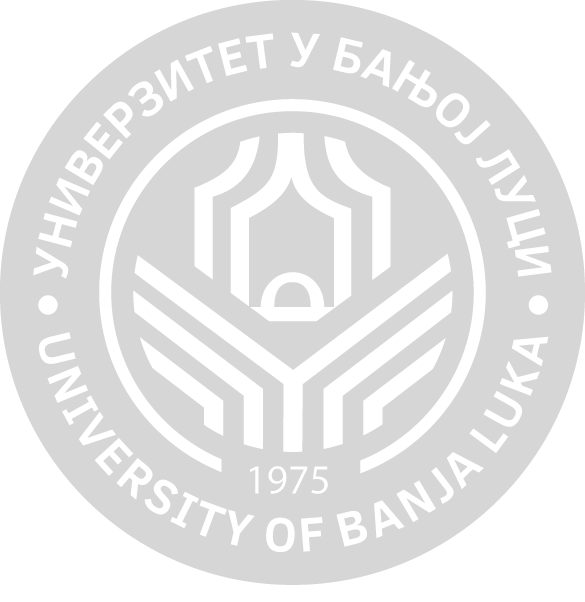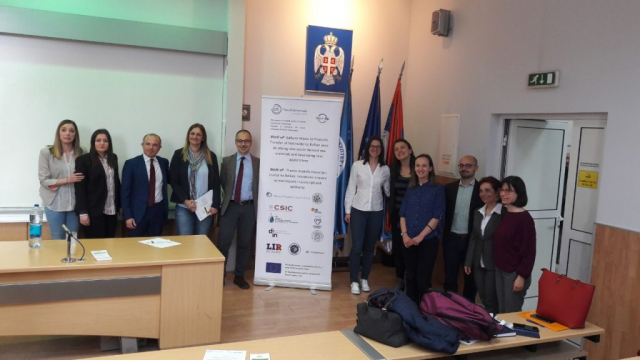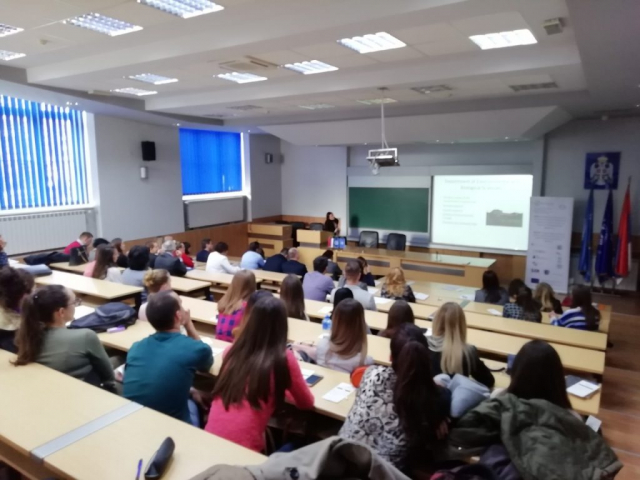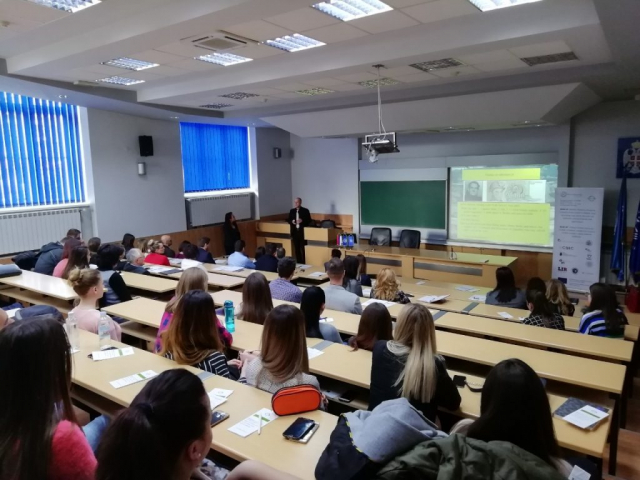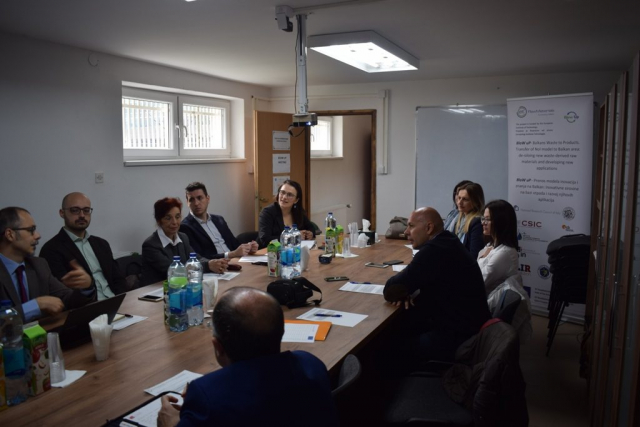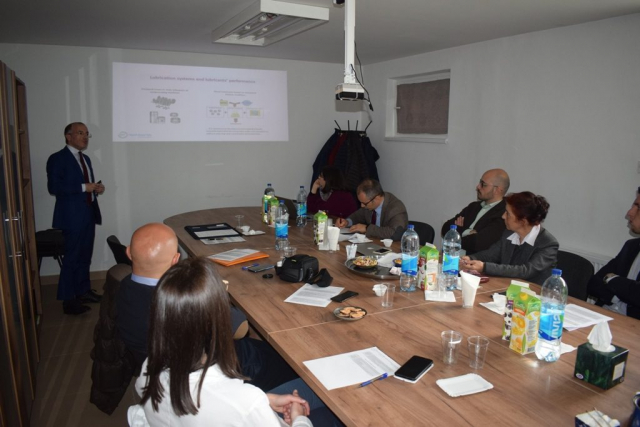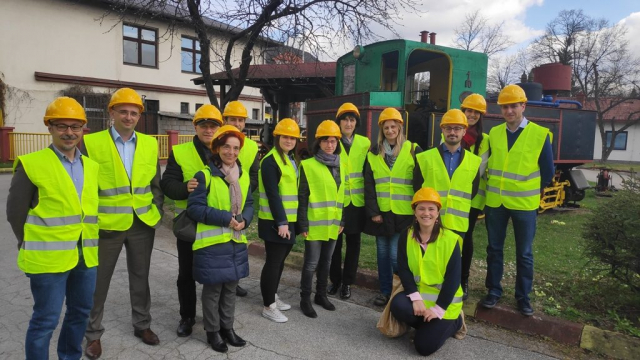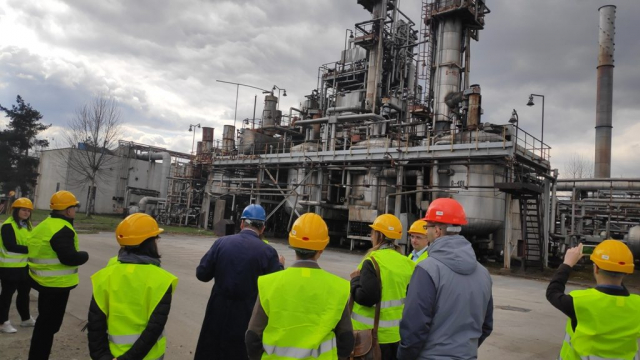Završna konferencija projekta „BloW Up“ ( / ) održana je 26. i 27. marta 2019. godine na Prirodno-matematičkom fakultetu Univerziteta u Banjoj Luci u zajedničkoj organizaciji sa partnerom LIR Evolucija. Projekat „BloW Up“ proučava balkanski otpad koji može biti upotrijebljen za nove proizvode i razvoj novih aplikacija, a finansiran je od strane Evropskog instituta za inovacije i tehnologiju. Cilj projekta je poboljšanje sektora sirovina u zemljama istočne i jugoistočne Evrope kroz transfer znanja i podršku razvoju novih aplikacija kroz bolje upravljanje sirovinama i otpadom. Saradnja između kompanija i naučnih institucija je jasno ojačana kroz projekat, što omogućava praktičnu primjenu naučnih rezultata za razvoj novih procesa koji se bave otpadom i sirovinama.
U okviru Završne konferencije 26. marta na Prirodno-matematičkom fakultetu Univerziteta u Banjoj Luci organizovan je završni seminar za umrežavanje sa ciljem povezivanja akademije i kompanija na temu: „Put do aktivnog uglja u BiH“. Teme seminara uključivale su istraživanje najnovijih mogućnosti u oblasti proizvodnje i primjene aktivnog uglja kako bi se potencijalni domaći proizvođači motivisali za početak proizvodnje ovog široko korišćenog i vrijednog materijala u Bosni i Hercegovini.
Takođe, u okviru konferencije, 27. marta je organizovana studijska posjeta kompaniji Destilacija Teslić, gdje su učesnici imali priliku upoznati se sa proizvodnim objektima i procesima. Više od 120 godina, ova fabrika se bavi proizvodnjom drvenog uglja, briketa i sirćetne kiseline. Međutim, ovaj proces proizvodnje bi se, uz neka poboljšanja i modifikacije, mogao prilagoditi za proizvodnju aktivnog uglja (nanoporoznog uglja), široko korišćenog materijala za filtracije za koji Bosna i Hercegovina takođe ima velike potrebe. Ovaj materijal se trenutno uvozi i koristi u medicinskim centrima, vodovodima, mljekarskoj industriji i drugim sektorima. Međutim, s obzirom na bogatstvo celuloznih sirovina iz Bosne i Hercegovine iz kojih se inače aktivni ugalj proizvodi, bilo bi moguće zadovoljiti sve domaće potrebe i ostvariti izvozni potencijal. Cijena gotovog proizvoda trenutno iznosi oko 3.000 EUR / tona na svjetskom tržištu. Kolege iz konzorcijuma „BloW Up“, posebno Bugarske akademije nauka i Instituta za hemiju ugljenika iz Španije, i dalje će igrati važnu savjetodavnu ulogu u budućoj saradnji između biznisa i akademske zajednice u BiH kroz ovaj, ali i kroz buduće projekte.
Ostali partneri na projektu su Institut za molekularnu nauku i tehnologiju Nacionalnog istraživačkog saveta (Italija), Odsjek za industrijsku hemiju „TosoMontanari“ na Univerzitetu u Bolonji, Grupa materijali za energiju i životnu sredinu Politehnike Milano, Odsjek za zaštitu životne sredine i hemijsko inženjerstvo Univerziteta u Oulu-Finska, Odsek za industrijsko inženjerstvo Univerziteta u Salernu, Studijski program Hemija PMF UNIBL, kompanija Tehnosint i LIR Evolucija.
Medijski linkovi:
Final Conference and networking event in the frame of the project „Blow Up“
The Final Conference of the project BLOW-UP was held on 26th and 27th of March 2019 at the Faculty of Science of the University of Banja Luka in joint organization of Faculty of Science and LIR Evolution.
The project BloW Up – Balkans Waste to Products. Transfer of NoI model to Balkan area: de-siloing new waste-derived raw materials and developing new applications is funded by the European Institute of Innovation and Technology. The aim of the project is to improve the raw materials sector in the countries of Eastern and South-Eastern Europe through knowledge transfer and support to development of new applications that will be reflected through better management of raw materials and waste. Cooperation between companies and scientific institutions is clearly strengthened through the project, what enables practical application of scientific results for the development of new processes dealing with waste and raw materials.
In the frame of the Final Conference on 26th of March at the Faculty of Science of the University of Banja Luka also the Final networking event was organized with an aim of connecting academia and companies on the topic: „The Way to the Active Carbon in BiH“. Topics of the seminar included exploration of the latest possibilities in the field of production and application of active carbon in order to motivate potential domestic producers to start production of this widely used and valuable material in Bosnia and Herzegovina.
As a part of the Conference, on 27th of March, study visit to the company Destilacija Teslić was organized, where the participants had the opportunity to get acquainted with the production facilities and processes. For more than 120 years, distillery has been engaged in the production of charcoal, briquettes and acetic acid. However, this production process could, with some improvements and modifications, be adapted to produce active carbon (nanoporous carbon), widely used purification material for which Bosnia and Herzegovina also has great needs. This material is currently being imported and used in medical centres, water supply, dairy industry and other sectors. However, given the variety of Bosnia and Herzegovina’s cellulosic raw materials from which it could produced, it would be possible to meet all domestic needs and also realize the export potential. The price of the finished product is currently about 3,000 EUR/ton in the world market. Colleagues from the Blow Up consortium, in particular the Bulgarian Academy of Sciences and the Institute of Carbon Chemistry from Spain, will continue to play an important advisory role in the future cooperation between businesses and academia through this, but also through future projects.
The project partners are the Institute of Molecular Science and Technology of the National Research Council (Italy), the Institute for Chemical Chemistry at the National Research Council (Spain), the Department of Industrial Chemistry „Toso Montanari“ at the University of Bologna, the Institute of Organic Chemistry and the Center for Phytochemistry of the Bulgarian Academy of Sciences, the Energy and Environment Materials Group of the Politecnico di Milano, the Department of Environmental Protection and Chemical Engineering of the University of Oulu, the Department of Industrial Engineering of the University of Salerno, the Faculty of Science Chemistry Study Program in Banja Luka, the company Tehnosint and LIR Evolution.
External links:
